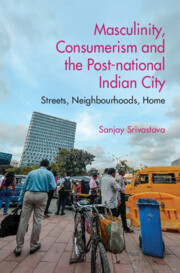Book contents
- Frontmatter
- Dedication
- Contents
- List of Figures
- Acknowledgements
- 1 Introduction: Masculinity, Modernity, Urbanity
- 2 Nationalism, Masculinity and the City
- 3 Dislocated Masculinities and the Unofficial City
- 4 Thrilling Affects: Sexuality, Masculinity, the City and ‘Indian Traditions’ in the Contemporary Hindi ‘Detective’ Novel
- 5 Fragmentary Pleasures: Masculinity, Urban Spaces and the Commodity Politics of ‘Religious Fundamentalists’
- 6 Technotopias: Masculinity, Women, the City and the Post-national Condition
- 7 Conclusion: Masculine Body Politics
- Bibliography
- Index
6 - Technotopias: Masculinity, Women, the City and the Post-national Condition
Published online by Cambridge University Press: 06 September 2022
- Frontmatter
- Dedication
- Contents
- List of Figures
- Acknowledgements
- 1 Introduction: Masculinity, Modernity, Urbanity
- 2 Nationalism, Masculinity and the City
- 3 Dislocated Masculinities and the Unofficial City
- 4 Thrilling Affects: Sexuality, Masculinity, the City and ‘Indian Traditions’ in the Contemporary Hindi ‘Detective’ Novel
- 5 Fragmentary Pleasures: Masculinity, Urban Spaces and the Commodity Politics of ‘Religious Fundamentalists’
- 6 Technotopias: Masculinity, Women, the City and the Post-national Condition
- 7 Conclusion: Masculine Body Politics
- Bibliography
- Index
Summary
Introduction
This chapter focuses on the politics of gender as it relates to young single women in the city. The rise of the youthful, unattached female consumer is an important aspect of contemporary urbanism. It both fuels the new economies of commerce and urbanism and is a site of masculine anxiety. Both in terms of a new readership for ‘women's magazines’ that carry explicit discussion of female sexuality (Chapters 4 and 5) and landscapes of leisure such as the Akshardham Temple complex in Delhi where ‘female visitors … move seamlessly between roles as consumers and devoutly religious persons’ (Srivastava 2017: 100), the city is increasingly the site of an alternative to the ‘self-sacrificing’ woman that has been the staple of Indian cultural discourse.
However, as the earlier chapters of the book have discussed, contemporary ideas of masculinity continue to draw upon long-standing ideas of male honour, family life and inviolable Indian traditions that lend stability to men's identities. The persistence of male identities of considerable vintage along with apparently altered notions of female behaviour calls for an understanding of the relationship between urban masculinity and women in the public sphere. The earlier chapters have suggested this in a tangential manner and the present one takes up this thread in a more focused way. The chapter explores contemporary narratives of urbanism, masculinities and women by explicitly utilising the two concepts – post-nationalism and moral consumption – that form the book's overarching analytical frameworks. Through these concepts, I explore the side-by-side existence of older cultures of masculinities and new forms of female identities and presence. I suggest that a significant way this otherwise hostile relationship is resolved is through imagining the city as a ‘technotopia’: a place made ‘better’ – and its problems resolved – through the intensive application of multiple technologies, including those of communication and surveillance. Within this context, my broader discussion is about the ways in which the urban technotopia is part of a masculinist imagination of making cities, and the ‘technological turn’ that I investigate in this chapter is the refashioning of a contemporary politics of masculinity.
In particular, the chapter investigates how an array of processes – of regional, national and global scales – play out as grounds for imagining the place of women's bodies across urban spaces at a time of significant social and cultural change.
- Type
- Chapter
- Information
- Masculinity, Consumerism and the Post-National Indian CityStreets, Neighbourhoods, Home, pp. 130 - 145Publisher: Cambridge University PressPrint publication year: 2023



